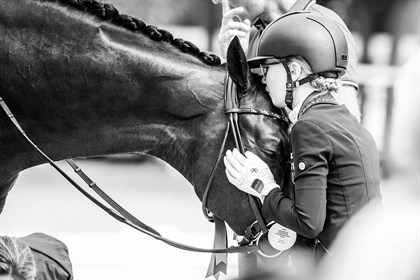|
This article first appeared in the September 2020 digital edition of Equestrian Life. To see what's in the current issue, click here.

Could training based on positive reinforcement be more effective than 'pressure release' training?
© FEI/Lukasz Kowalski
The carrot or the liquorice? Positive reinforcement
By Dr Kerry Mack
New research shows that rewarding good behaviour gets better results than punishing wrong conduct. Animal behaviour consultants agree that positive reinforcement should be the foundation of teaching and training.
Scientists have been studying how animals learn for 130 years, and yet horse riders can be slow to use what has been learned. Pavlov did his famous dog experiments in the 1890s. Skinner formulated his theories about operant conditioning from the 1930s. Operant conditioning is learning behaviour by different types of reinforcement. Positive reinforcement is essentially rewarding the behaviour with something the trainer adds. For example, a food reward can be given when the horse demonstrates the behaviour you want to train. Most horse training is based on negative reinforcement where the trainer removes something when the behaviour is shown...
Read the full article in the September 2020 issue of Equestrian Life magazine here.
|
